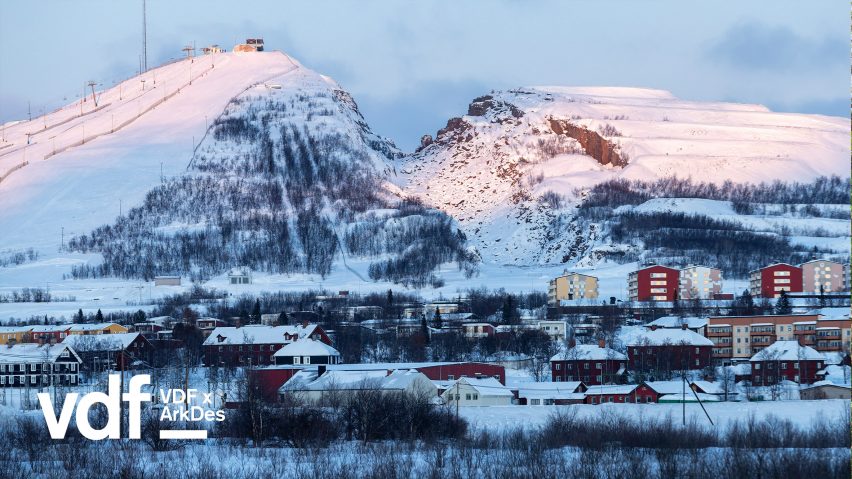As part of today's collaboration with ArkDes for Virtual Design Festival, curator and editor Carlos Mínguez Carrasco explains how the architecture centre's idea for its book Kiruna Forever came about and why Kiruna's history is so fascinating.
The exhibition Kiruna Forever at ArkDes, Sweden's national centre for architecture and design, takes a close look at the relocation of the northern Swedish city, which is being moved 1.86 miles as the underground iron-ore mine the city has been built around threatens to swallow it.
"A third of the population must relocate, housing blocks and heritage buildings are being demolished or moved, and a new city centre is taking shape," Mínguez Carrasco, who curated the exhibition, told Dezeen.
"All of it happening in a land inhabited for centuries by the Indigenous population of the region: the Sámi."
The eponymous book that accompanies the exhibition features photographs of Kiruna by Iwan Baan, Lennart Durehed, Gregor Kallina, Erik Lefvander, Borg Mesch, Jessica Nildén, Klaus Thymann and Kjell Törma, as well as stories from people who have a relationship with the city.
Both the exhibition and the book are meant to be a record of the changes the city is undergoing, said Daniel Golling, who co-edited the book together with Mínguez Carrasco, but also serve another purpose.
"The book is also a record of the emotional impact the move and the expansion of the mine, both in Kiruna and in neighbouring Malmberget, has had on its citizens," he told Dezeen.
"We are very pleased to have been able to include a set of diverse voices and perspectives in the book, one of them from Ann-Helén Laestadius, an acclaimed Swedish-Sámi author who's written a very emotional text expressing the love and loss she felt for Ullspiran, the rather anonymous 60s housing block in Kiruna where she grew up and that happened to be the first neighbourhood in the city to be demolished," Golling said.
"Equally powerful, but more harrowing is sportswriter Erik Niva's recollection of being a teenager in Malmberget, a town that, in his own words lies far beyond 'the Sweden that counts' and that is literally being swallowed by the open mine pit in its centre."
ArkDes focuses on projects that look at relevant contemporary issues through the lens of architecture and design, and believes the relocation of Kiruna is one of the most important urban transformations in Sweden's recent history.
"We soon realised that the northern region, an area often receiving low attention, was witnessing some of the biggest urban modifications in the country," Mínguez Carrasco said.
"The arctic is a region that is experiencing radical transformations in which natural resources, climate, and forms of sovereignty are being tested, and the ongoing relocation of Kiruna plays a specially important role."
The book deals with the questions posed as a result of the city's relocation, about "losses and hopes, displacement and attachment," as Mínguez Carrasco put it.
"The relocation demands a reconciliation among different communities' needs – some of them struggling to detach themselves from a historic servitude to the mine, some of them diametrically opposed to the fact that the land is being exploited at all," he explained.
Kiruna's history as a city also makes its relocation extra poignant. Since its official foundation in 1900, the city has played an important role in the urbanisation of the northern region of Sweden, becoming a critical place where the most renowned architects and urban planners in Sweden test their ideas for the future of the Arctic, according to Mínguez Carrasco.
"Architecture is never neutral and it is often complicit in reinforcing power structures; in Kiruna, the role of architecture is no exception," he said.
The relocation of the city was initiated in 2004, and the construction of and definition of the new Arctic city is planned until 2100.
"I'm sure that the extraordinary text and image material we've collected will be a real eye-opener to the readers of the book," Golling said. "The story of Kiruna is fascinating, but it's not only about the current relocation or the future of the city, but just as much about the past."
About ArkDes
ArkDes, Sweden's national centre for architecture and design, is a museum, a study centre and an arena for debate and discussion about the future of architecture, design and citizenship.
Its aim is to increase knowledge and cultivate debate around how architecture and design affect our lives as citizens, and to influence this change through debate, exhibitions, campaigns and research relating to Swedish and international architecture and design.
Main image is from the exhibition and photo is by Iwan Baan.
Partnership content with ArkDes.

